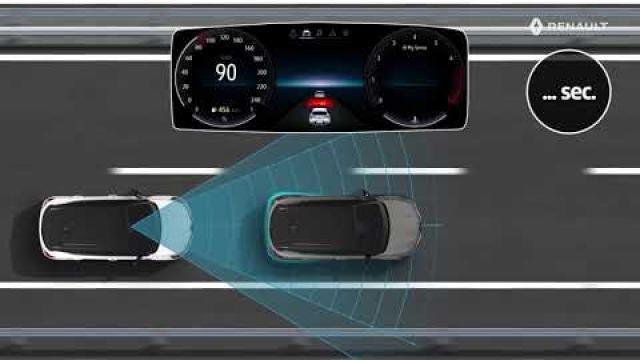SAFE DISTANCE ALERT
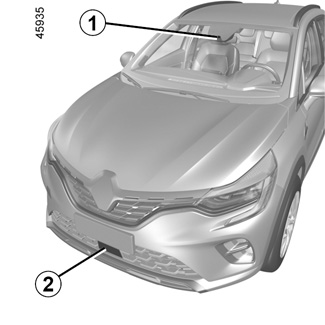
Using the information from the radar 2 and camera 1, this function informs the driver of the time interval between their vehicle and the vehicle in front so that a safe stopping distance between the two vehicles can be maintained.
The function is activated when the vehicle speed is between about 19 and 124 mph (30 and 200 km/h).
Location of the camera 1
Make sure the windscreen is not obscured (by dirt, mud, snow, condensation etc.).
Location of the radar 2
Ensure that the radar area is not obstructed (by dirt, mud, snow, a badly fitted front number plate), impacted, modified (including painting) or hidden by any accessory fitted on the front of the vehicle (on the grille or logo etc.).
This function is an additional driving aid. This function is not under any circumstances intended to replace the due care and attention of the driver, who should at all times be in control of the vehicle.
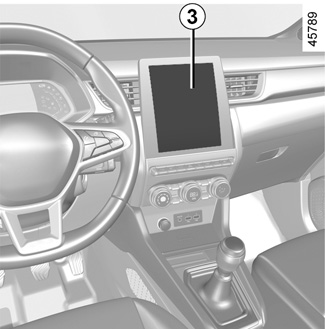
Activating/deactivating the function
Vehicles fitted with a multimedia screen 3
To activate or deactivate the function, refer to the multimedia instructions.
Select “ON” or “OFF”.
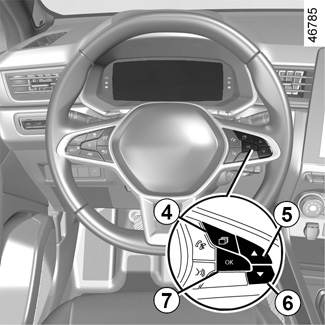
Vehicles not fitted with a multimedia screen
- With the vehicle stopped, press the switch 4 as many times as required to reach the “Vehicle” tab;
- press the 5 or 6 control repeatedly to reach the “Settings” menu. Press the switch 7 OK;
- press the 5 or 6 control repeatedly to reach the “DRIVING ASSIST” menu. Press the switch 7 OK;
- press the 5 or 6 control repeatedly to reach the “Distance warning” menu. Press the switch 7 OK;
- Press the switch 7 OK again to activate or deactivate the function:
= function activated
< function deactivated
Each time the vehicle is started, the function continues the mode saved the last time the engine was stopped.
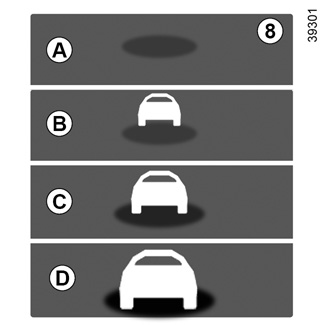
Operation
With the function activated, the 8 indicator is displayed on the instrument panel and informs the driver of the distance between their vehicle and the vehicle in front.
- A (grey): function not operational;
- A (green): no vehicle detected;
- B (green): the time interval is greater than or equal to around two seconds (distance between the two vehicles adapted to your speed);
- C (orange): the time interval falls between around 1 and 2 seconds (insufficient distance between the two vehicles);
- D (red): the time interval is less than or equal to around one second (very insufficient distance between the two vehicles).
If the interval between the two vehicles is less than approximately 0.5 seconds, the 8 indicator and the D display will flash in red on the instrument panel along with “-.- s”.
Under certain conditions, the time interval may not be displayed:
- while cornering;
- when changing lane;
- if the vehicle in front is sufficiently far or outside the range of the radar or camera.
The measurement is displayed for information: the system does not carry out any action on the vehicle.
This function is not designed for use in urban conditions or for a dynamic driving style (sudden cornering, acceleration, braking, etc.), but rather for stable driving conditions.
The function does not interact with the braking system.
The radar and camera zones must be kept clean and free of any tampering in order to ensure the proper operation of the system.
Any work carried out in the area where the radar or camera is located (repairs, replacements, windscreen and/or bumper modifications, etc.) must be carried out by a qualified professional.
This function is an additional driving aid. This function is not under any circumstances intended to replace the due care and attention of the driver, who should at all times be in control of the vehicle.
System servicing/repairs
- In the event of an impact, the radar and/or camera alignment may be changed and its operation may consequently be affected. Deactivate the function and consult an authorised dealer.
- Any work carried out in the area where the radar and/or camera is located (replacements, repairs, windscreen and/or bumper modifications, etc.) must be carried out by a qualified professional.
Only an authorised dealer is qualified to service the system.
In the event of system disturbance
- obstruction of the windscreen or the bumper (by dirt, glass, snow, condensation, etc.);
- a complex environment (metal bridge, tunnel etc.);
- poor weather conditions (snow, hail, black ice etc.);
- poor visibility (night, fog etc.);
- poor contrast between the vehicle preceding it and the surrounding area (e.g. white vehicle in a snowy area etc.) ;
- being dazzled (glaring sun, lights of vehicles travelling in the opposite direction etc.);
- the road is narrow, winding and undulating (tight bends etc.)
Risk of erroneous false alarms.
